
Find Help
More Items From Ergsy search
-

When should I consider surgery for Carpal Tunnel Syndrome?
Relevance: 100%
-

What does Carpal Tunnel Syndrome surgery involve?
Relevance: 99%
-

Carpal Tunnel Syndrome
Relevance: 98%
-
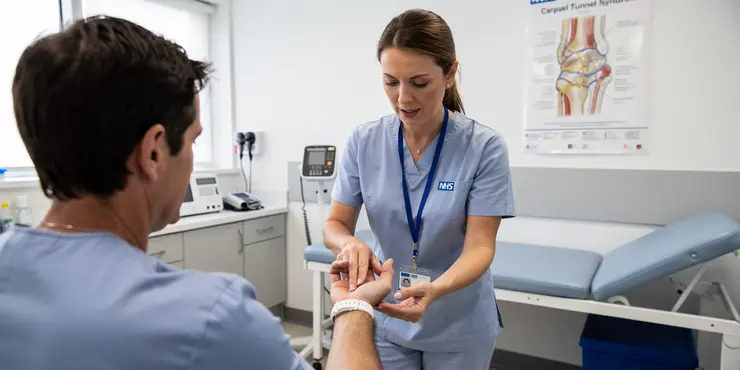
Is Carpal Tunnel Syndrome covered by the NHS?
Relevance: 96%
-

What is Carpal Tunnel Syndrome (CTS)?
Relevance: 93%
-
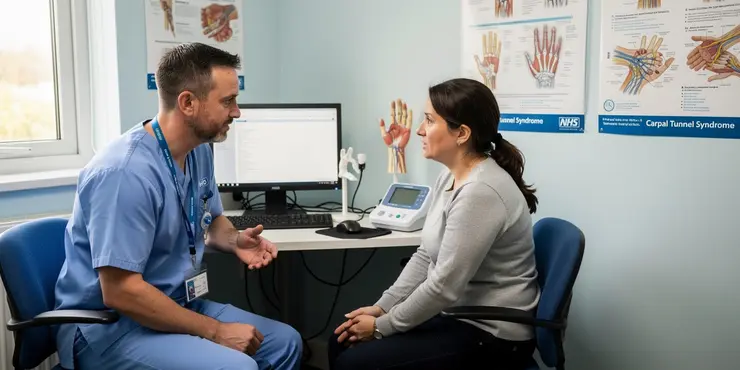
What causes Carpal Tunnel Syndrome?
Relevance: 90%
-

Can Carpal Tunnel Syndrome recur after treatment?
Relevance: 88%
-
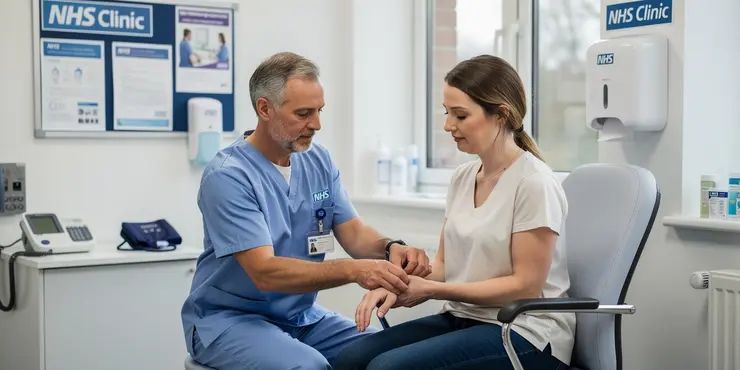
How is Carpal Tunnel Syndrome diagnosed?
Relevance: 88%
-

Are there any alternative treatments for Carpal Tunnel Syndrome?
Relevance: 85%
-
How can I prevent Carpal Tunnel Syndrome?
Relevance: 85%
-
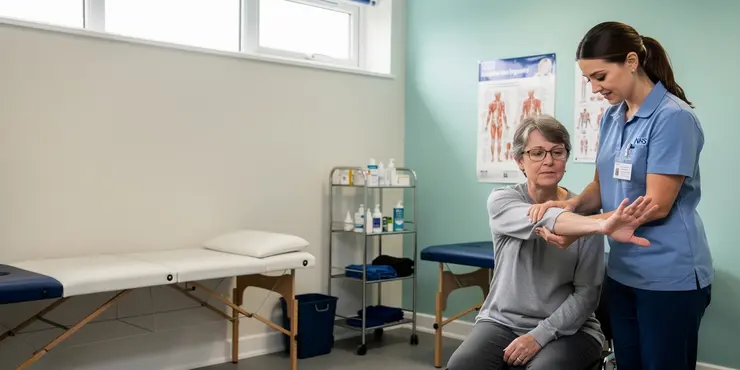
Are there specific exercises that can help with Carpal Tunnel Syndrome?
Relevance: 84%
-

What non-surgical treatments are available for Carpal Tunnel Syndrome?
Relevance: 81%
-

What is the recovery time after Carpal Tunnel Surgery?
Relevance: 78%
-

What are the common symptoms of Carpal Tunnel Syndrome?
Relevance: 77%
-

Can I work or continue sports activities if I have Carpal Tunnel Syndrome?
Relevance: 75%
-

Can lifestyle changes help manage Carpal Tunnel Syndrome?
Relevance: 75%
-

What is Cushing's syndrome?
Relevance: 28%
-

Surgery under local anaesthetic in the Minor Ops Unit at North Bristol NHS Trust
Relevance: 26%
-

Munchausen's syndrome | NHS
Relevance: 26%
-

Greater trochanteric pain syndrome
Relevance: 25%
-
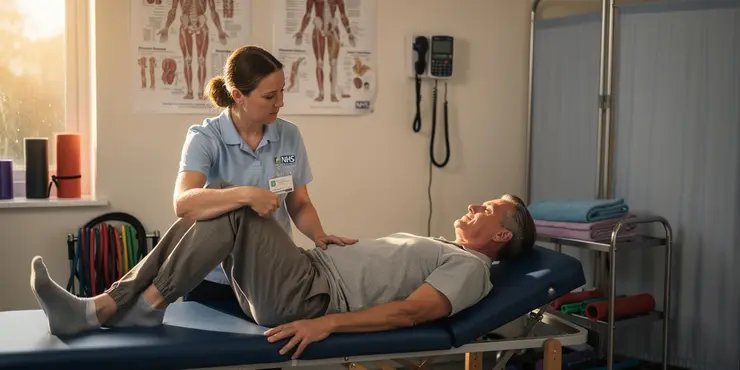
Exercises for sciatica: piriformis syndrome | NHS
Relevance: 25%
-

What is complex sleep apnea syndrome?
Relevance: 24%
-

Prader-Willi Syndrome | NHS
Relevance: 24%
-
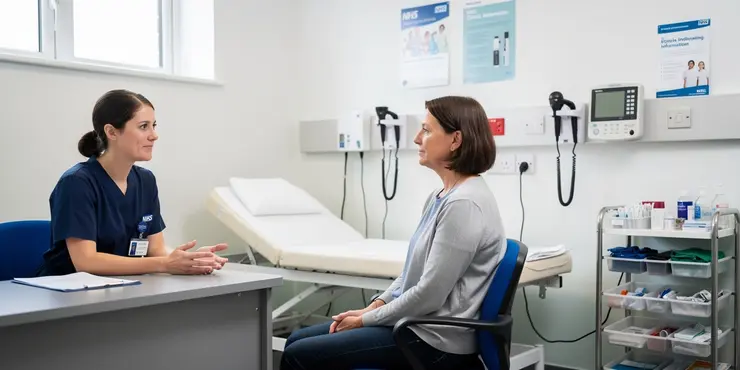
What is complex sleep apnea syndrome?
Relevance: 24%
-

Prostate Surgery
Relevance: 24%
-

Is chronic fatigue syndrome contagious?
Relevance: 23%
-

Turner syndrome: Beyond the classic XO phenotype
Relevance: 23%
-

Having a child with Down's syndrome | NHS
Relevance: 23%
-

Down's syndrome: Emily's story | NHS
Relevance: 23%
-

Charles Bonnet Syndrome
Relevance: 23%
-

Is surgery necessary for Crohn's disease?
Relevance: 22%
-

Lumbar surgery | NHS
Relevance: 22%
-

What causes chronic fatigue syndrome?
Relevance: 22%
-

Weight Loss Surgery
Relevance: 22%
-
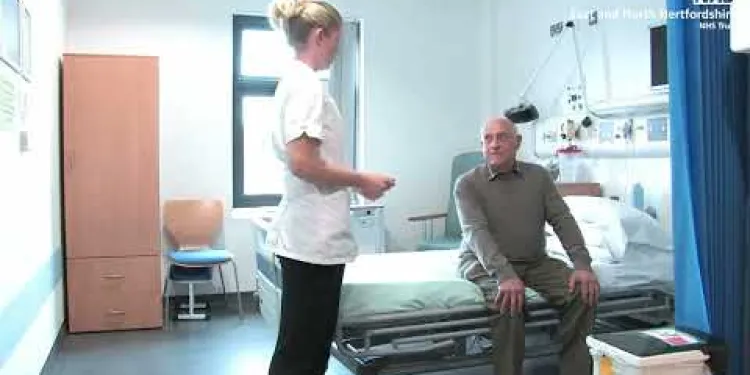
A journey to hip surgery
Relevance: 22%
-
What is chronic fatigue syndrome?
Relevance: 22%
-

What is congenital rubella syndrome?
Relevance: 22%
-

Having a child with Edwards' syndrome (trisomy 18) | NHS
Relevance: 21%
-

What is the difference between autism and Asperger's syndrome?
Relevance: 21%
-

On the day of your cataract surgery
Relevance: 21%
Understanding Carpal Tunnel Syndrome
Carpal Tunnel Syndrome (CTS) is a condition that affects the hand and arm, causing pain, numbness, and tingling. It occurs when the median nerve, which runs from the forearm into the palm of the hand, becomes compressed at the wrist. This can be due to a variety of factors, including repetitive hand movements, certain health conditions, and even pregnancy. Diagnosing CTS typically involves a combination of physical examinations and tests such as nerve conduction studies.
Initial Non-Surgical Treatments
For many individuals, symptoms of CTS can be managed without surgery. Non-surgical treatments include wearing wrist splints, particularly at night, to reduce pressure on the median nerve. Lifestyle modifications, such as taking regular breaks from repetitive activities and adjusting ergonomic workstations, can also help. Physiotherapy exercises and medications to reduce inflammation might be recommended. In some cases, corticosteroid injections are administered to provide temporary relief.
When to Consider Surgery
Surgery for Carpal Tunnel Syndrome should be considered if non-surgical interventions have failed to alleviate the symptoms. Persistent or worsening symptoms, such as constant numbness, significant reduction in hand strength, or sleep disruptions due to pain, might indicate the need for surgical intervention. If CTS significantly affects daily activities and quality of life, surgical options might be necessary. Early surgery is advisable in severe cases where there is evidence of nerve damage, as indicated by electromyography (EMG) or a decrease in muscle tissue of the thumb’s base.
Types of Surgery and Recovery
One common surgical procedure for CTS is a carpal tunnel release. This can be performed as an open surgery or endoscopically. Open carpal tunnel release involves a longer incision but allows direct visualization and access. Endoscopic surgery uses a smaller incision and potentially a quicker recovery time. Both types aim to relieve pressure by cutting the ligament pressing on the median nerve. Post-surgery, recovery involves a period of rest, followed by gradual activities to regain strength and mobility. Full recovery can take several weeks to months.
Consulting Healthcare Professionals
If you are experiencing symptoms suggestive of Carpal Tunnel Syndrome, it is important to consult with healthcare professionals. In the UK, your GP can provide initial assessment and refer you to specialists such as rheumatologists or neurologists as needed. They can help determine the severity of your condition and discuss the most suitable treatment options, including the timing and necessity of surgery. Remember, early intervention can prevent long-term damage and improve outcomes significantly.
What is Carpal Tunnel?
Carpal Tunnel Syndrome (CTS) is when your hand and arm hurt or feel numb and tingly. This happens because a nerve in your wrist is squeezed. Things like doing the same movements with your hands a lot, some health problems, or being pregnant can cause this. Doctors use check-ups and special tests to find out if you have CTS.
Ways to Feel Better Without Surgery
Most people can feel better without an operation. Using wrist splints, especially at night, can help. These splints keep your wrist straight to take pressure off the nerve. Taking breaks from doing the same hand movements and setting up your workspace in a comfy way also helps. Doing exercises with a physiotherapist and taking medicines for swelling can help too. Sometimes, doctors might give injections to stop the pain for a while.
When to Think About Surgery
If other treatments don't help, doctors might suggest surgery. This is also true if your hand always feels numb, is not strong, or it is hard to sleep because of the pain. If CTS is causing big problems in your daily life, surgery might be needed. Having surgery early is important if there is nerve damage. Doctors can check this with special tests.
Types of Surgery and Getting Better
One type of surgery is called carpal tunnel release. It can be done in two ways: open surgery or endoscopic surgery. Open surgery makes a bigger cut, while endoscopic surgery makes a smaller one and might heal faster. Both aim to cut the ligament that is pressing on the nerve. After surgery, you need to rest. Then, slowly start using your hand again to get strong. Full healing can take weeks or months.
Talk to a Doctor
If your hand hurts or feels weird, talk to a doctor. In the UK, you can see your GP first. They might send you to a specialist, like a rheumatologist or neurologist, who knows more about CTS. They will check how serious your CTS is and talk about the best treatments, including surgery if needed. Getting help early can stop more damage and make you feel better faster.
Frequently Asked Questions
What is carpal tunnel syndrome?
Carpal tunnel syndrome is a condition caused by pressure on the median nerve in the wrist, leading to numbness, tingling, or weakness in the hand.
What are the common symptoms of carpal tunnel syndrome?
Common symptoms include numbness, tingling, or pain in the thumb, index, and middle fingers, weakness in the hand, and a tendency to drop objects.
When should I consider surgery for carpal tunnel syndrome?
Surgery may be considered if symptoms are severe, persistent, and not improving with conservative treatments like splinting, anti-inflammatory medications, or physical therapy.
How is carpal tunnel syndrome diagnosed?
Diagnosis is usually made based on patient history, physical examination, and sometimes nerve conduction studies or electromyography.
What are the conservative treatments for carpal tunnel syndrome?
Conservative treatments include wrist splinting, activity modification, nonsteroidal anti-inflammatory drugs (NSAIDs), corticosteroid injections, and physical therapy.
What does carpal tunnel release surgery involve?
Carpal tunnel release surgery involves cutting the ligament that forms the top of the carpal tunnel to relieve pressure on the median nerve.
Is carpal tunnel surgery effective?
Carpal tunnel surgery is generally effective in relieving symptoms, with many patients experiencing significant improvement.
How long is the recovery time after carpal tunnel surgery?
Recovery can vary, but most people can return to light activities within a few days and full recovery may take several weeks or months.
Are there risks associated with carpal tunnel surgery?
As with any surgery, there are risks such as infection, nerve damage, stiffness, and incomplete relief of symptoms.
How is carpal tunnel syndrome related to repetitive strain?
Repetitive hand movements, particularly wrist overextension, can contribute to the development and exacerbation of carpal tunnel syndrome.
Can lifestyle changes help with carpal tunnel syndrome?
Yes, lifestyle changes such as ergonomic adjustments, taking breaks, and avoiding wrist strain can help manage symptoms.
Who is at higher risk for developing carpal tunnel syndrome?
Higher risk groups include individuals with jobs involving repetitive hand motions, diabetes, rheumatoid arthritis, or those with a genetic predisposition.
Will carpal tunnel syndrome improve without surgery?
In some cases, symptoms improve with conservative treatments or lifestyle changes, but persistent or severe cases may need surgery.
Can carpal tunnel syndrome recur after surgery?
While uncommon, symptoms can recur after surgery, which may require additional treatment.
How do night splints help with carpal tunnel syndrome?
Night splints help keep the wrist in a neutral position, reducing pressure on the median nerve and alleviating symptoms during sleep.
How soon will I notice improvement after carpal tunnel surgery?
Symptom relief can be immediate for many, but full recovery and improvement of strength and sensation can take time.
What is the success rate of carpal tunnel surgery?
The success rate is high, with most patients experiencing symptom improvement, but outcomes can vary based on individual conditions.
Can physical therapy help with carpal tunnel syndrome?
Physical therapy may help improve symptoms through exercises that enhance wrist strength and flexibility and correct ergonomic issues.
Does pregnancy affect carpal tunnel syndrome?
Pregnancy can exacerbate carpal tunnel syndrome due to fluid retention, but symptoms often improve after childbirth.
What should I expect during a consultation for carpal tunnel surgery?
During a consultation, a doctor will review your symptoms, medical history, and may conduct tests to determine if surgery is appropriate.
What is carpal tunnel syndrome?
Carpal tunnel syndrome is when your wrist hurts because a nerve is pressed.
This nerve is called the "median nerve." It helps you feel and move your hand.
Your wrist has a small space called the "carpal tunnel." If this space gets smaller, it presses on the nerve.
You might feel pain, tingling, or weakness in your hand.
To help, you can rest your hand, do gentle exercises, or talk to a doctor.
You can also wear a wrist splint to keep your hand in a good position.
Carpal tunnel syndrome happens when there is pressure on a nerve in your wrist. This can make your hand feel numb, tingly, or weak.
What signs show carpal tunnel syndrome?
Carpal tunnel syndrome can make your hand hurt or feel numb. Here are some signs to look for:
- Your hand or fingers tingle or feel like pins and needles.
- Your wrist or hand hurts at night.
- Your hand feels weak, and it is hard to hold things.
- Your thumb, index, and middle fingers feel numb.
To help you understand better, you can use pictures or videos about carpal tunnel syndrome. You can also talk to a doctor or nurse who can explain more.
Signs you might notice are your thumb, pointer finger, and middle finger feeling numb, tingly, or painful. Your hand might feel weak, and you might drop things more often.
When should I think about surgery for carpal tunnel syndrome?
Carpal tunnel syndrome can make your hand and wrist hurt or feel weak.
Here are times to think about surgery:
- Your hand and wrist still hurt after trying other treatments like wearing a wrist brace or taking medicine.
- You have trouble doing everyday things like holding a cup or typing.
- Your doctor tells you that surgery can help you feel better.
You can ask a doctor for more information. They can help you make the best choice.
You might find it helpful to have someone go with you to the doctor. They can help remember what the doctor says.
If your symptoms are very bad, last a long time, and do not get better with other treatments like wearing a splint, taking medicine, or doing exercises, surgery might be an option.
How do doctors find out if you have carpal tunnel syndrome?
Doctors ask about how your hands feel. They may ask if your hands tingle or hurt.
They will look at your hands and feel them.
The doctor might do a test. They may use a machine to see how your nerves work.
If you have carpal tunnel syndrome, your doctor will help you feel better.
You can use helpful tools like a wrist rest when typing to help your hands.
Your doctor can find out what's wrong by asking about your health, checking your body, and sometimes using special tests called nerve tests. These tests look at how well your nerves are working.
How can we treat carpal tunnel syndrome without surgery?
Here are some easy treatments for carpal tunnel syndrome:
- Rest your hand: Try not to use your hand too much. Take breaks often.
- Wear a wrist splint: A wrist splint helps keep your hand straight, especially when you sleep.
- Ice the area: Put ice on your wrist to reduce swelling.
- Do gentle stretches: Move your hand and fingers gently to help them feel better.
- Try over-the-counter medicine: Some pills, like ibuprofen, can help reduce pain and swelling.
Ask a doctor or physical therapist for more advice and help.
There are some simple ways to help with wrist pain. You can try wearing a wrist splint. This keeps your wrist still. You can also change how you do things to avoid hurting your wrist. Medicines like ibuprofen can help with pain and swelling. Your doctor might give you a special shot to help, too. Physical therapy exercises can make your wrist stronger and hurt less.
What happens in carpal tunnel release surgery?
Carpal tunnel surgery is when a doctor helps your hand feel better. They fix a small tunnel in your wrist. This can help stop pain and make your fingers and hand feel better.
If you are having this surgery, ask someone to explain it to you. They can use pictures to help. You might also want to write down questions you have.
Carpal tunnel surgery is when a doctor cuts a band in your wrist. This band is pressing on a nerve and making your hand hurt. The surgery helps to stop the pain.
Does carpal tunnel surgery work well?
Carpal tunnel surgery can help if your hand or wrist hurts a lot. A doctor can do this surgery to make the pain go away. Many people feel better after the surgery.
If you have questions, you can:
- Ask a doctor for advice.
- Talk to someone who had the surgery.
It can be helpful to:
- Use pictures or videos to understand how the surgery works.
- Write down any questions you have so you don't forget to ask.
Carpal tunnel surgery usually works well. It helps make the pain and symptoms much better. Most people feel a lot better after the surgery.
How long does it take to get better after carpal tunnel surgery?
After you have surgery for carpal tunnel syndrome, it can take some time to feel better. Here is what to expect:
- Most people start to feel better in about 2 to 6 weeks.
- Sometimes it can take 3 to 12 months to feel fully better.
Here are some tips to help you:
- Rest your hand and wrist.
- Do gentle exercises if your doctor says it is okay.
- Follow your doctor’s advice.
You can also ask someone to help you with things like cooking and cleaning while you recover.
Getting better can take different times for people. Most people can start doing easy things after a few days. It can take many weeks or even months to feel completely well again.
What are the dangers of carpal tunnel surgery?
All surgeries have risks. You might get an infection, damage a nerve, feel stiff, or not feel better.
Why does carpal tunnel syndrome happen when you do the same thing a lot?
Doing the same hand movements over and over, especially bending the wrist too much, can make carpal tunnel syndrome worse or help cause it.
Can changing how we live help with carpal tunnel syndrome?
Carpal tunnel syndrome can make your hands hurt or feel numb. Let's see how some changes in daily habits might help!
- Rest your hands: Take breaks often. Give your hands a good rest.
- Stretch fingers and wrists: Gently move and stretch your hands and wrists. This can feel nice and help them move better.
- Sit well: When using a computer, sit straight. Make sure your keyboard and mouse are easy to reach.
- Use soft pads: Put cushions under your wrists when working at a desk. This can help with comfort.
- Stay active: Exercise can help your body stay strong and healthy.
Try using some of these ideas. If your hands still hurt, talk to a doctor or nurse. They know how to help you feel better.
Yes, you can make changes to help your symptoms. Try to sit and work comfortably. Take breaks often, and be careful not to hurt your wrists.
Who is more likely to get carpal tunnel syndrome?
Some people have a bigger chance of getting carpal tunnel syndrome.
You might be more at risk if you:
- Use your hands a lot for work or play, like typing or drawing.
- Have health problems like diabetes or arthritis.
- Are pregnant, as it can cause swelling.
If you are worried, ask a doctor or a grown-up for help.
Tools like voice-to-text or taking breaks can help you use your hands less.
Some people have a higher chance of getting this problem with their hands. These people might have jobs where they do the same thing with their hands over and over again. People with diabetes or a type of arthritis called rheumatoid arthritis can also have a higher chance. Sometimes, people can have this problem because it runs in their family.
Can carpal tunnel syndrome get better without surgery?
Sometimes, people feel better with simple treatments or by changing their daily habits. But if someone still feels bad or feels very bad, they might need an operation to help them get better.
Can carpal tunnel syndrome come back after an operation?
Sometimes, symptoms can come back after surgery. This doesn't happen often. If symptoms do come back, you might need more treatment.
How do night splints help with carpal tunnel?
Carpal tunnel happens when a nerve in your wrist gets squeezed.
Night splints are special wrist bands you wear when you sleep. They keep your wrist straight. This helps stop the squeezing.
Using a night splint can help your wrist feel better.
You can ask a doctor or therapist for the right splint.
Try to wear it every night to help your wrist heal.
Remember to take breaks from activities that hurt your wrist during the day.
Night splints are special braces you wear on your wrist. They help keep your wrist straight while you sleep. This reduces the pressure on a nerve called the median nerve. It helps to stop pain and other problems.
When will I feel better after carpal tunnel surgery?
You might feel better quickly. Some people notice a change straight away. For others, it can take a few weeks.
Be patient and don't rush. It's normal for recovery to take time. Listen to your doctor's advice.
To help while you wait, try these tips:
- Rest your hand when you can.
- Ask someone to help with tricky tasks.
- Use a squeeze ball to gently exercise your hand.
Many people feel better right away, but getting all your strength and feeling back can take a while.
How often does carpal tunnel surgery work?
Most people feel better after treatment. But some people might not because everyone is different.
Can physical therapy help with wrist pain called carpal tunnel?
Do your hands feel tingly or hurt? This might be carpal tunnel syndrome. Physical therapy can help make your hands feel better.
Here’s how physical therapy can help:
- Exercises: Stretching and moving your hands can help make them strong.
- Braces: Wearing a special glove can stop your wrist from bending too much.
- Massage: Rubbing your hands can help with pain.
You can ask a physical therapist for help. They can teach you exercises and other ways to feel better.
Physical therapy can help make your wrist feel better. It includes exercises that make your wrist stronger and more flexible. It also helps you use your wrist in a way that doesn't hurt.
Can being pregnant change carpal tunnel syndrome?
When a person is pregnant, their body changes a lot. This can sometimes make carpal tunnel syndrome worse. Carpal tunnel syndrome is when your hand and fingers feel tingly or painful because of pressure on a nerve in your wrist.
If you are pregnant and have these feelings in your hand, it can be because of carpal tunnel syndrome. Talk to your doctor if this happens. They can help you find ways to feel better.
Things that might help include:
- Wearing a special wrist brace at night to keep your wrist straight
- Resting your hands and wrists
- Gentle hand exercises
If you have questions, ask someone you trust. You can also look for videos that explain carpal tunnel syndrome. Remember, you are not alone, and there are people who can help you.
When you're pregnant, your body holds more water. This can make carpal tunnel syndrome worse. But don't worry, it usually gets better once the baby is born.
What will happen at my carpal tunnel surgery meeting?
When you visit the doctor to talk about carpal tunnel surgery, here is what you can expect:
- The doctor will ask about your hand pain and numbness.
- You might need to have some tests to check your hand.
- The doctor will explain how the surgery works.
- You can ask questions if you don't understand something.
- A family member or friend can come with you to help remember the details.
Remember, it's okay to take notes or ask the doctor to repeat if you need more explanation.
When you visit the doctor, they will talk to you about how you feel, look at your past health, and might do some tests. This helps them decide if you need an operation.
If you want help to understand better, you can use a parent, friend, or support worker to explain things.
Useful Links
This website offers general information and is not a substitute for professional advice.
Always seek guidance from qualified professionals.
If you have any medical concerns or need urgent help, contact a healthcare professional or emergency services immediately.
Some of this content was generated with AI assistance. We’ve done our best to keep it accurate, helpful, and human-friendly.
- Ergsy carfully checks the information in the videos we provide here.
- Videos shown by Youtube after a video has completed, have NOT been reviewed by ERGSY.
- To view, click the arrow in centre of video.
- Most of the videos you find here will have subtitles and/or closed captions available.
- You may need to turn these on, and choose your preferred language.
- Go to the video you'd like to watch.
- If closed captions (CC) are available, settings will be visible on the bottom right of the video player.
- To turn on Captions, click settings .
- To turn off Captions, click settings again.
More Items From Ergsy search
-

When should I consider surgery for Carpal Tunnel Syndrome?
Relevance: 100%
-

What does Carpal Tunnel Syndrome surgery involve?
Relevance: 99%
-

Carpal Tunnel Syndrome
Relevance: 98%
-

Is Carpal Tunnel Syndrome covered by the NHS?
Relevance: 96%
-

What is Carpal Tunnel Syndrome (CTS)?
Relevance: 93%
-

What causes Carpal Tunnel Syndrome?
Relevance: 90%
-

Can Carpal Tunnel Syndrome recur after treatment?
Relevance: 88%
-

How is Carpal Tunnel Syndrome diagnosed?
Relevance: 88%
-

Are there any alternative treatments for Carpal Tunnel Syndrome?
Relevance: 85%
-
How can I prevent Carpal Tunnel Syndrome?
Relevance: 85%
-

Are there specific exercises that can help with Carpal Tunnel Syndrome?
Relevance: 84%
-

What non-surgical treatments are available for Carpal Tunnel Syndrome?
Relevance: 81%
-

What is the recovery time after Carpal Tunnel Surgery?
Relevance: 78%
-

What are the common symptoms of Carpal Tunnel Syndrome?
Relevance: 77%
-

Can I work or continue sports activities if I have Carpal Tunnel Syndrome?
Relevance: 75%
-

Can lifestyle changes help manage Carpal Tunnel Syndrome?
Relevance: 75%
-

What is Cushing's syndrome?
Relevance: 28%
-

Surgery under local anaesthetic in the Minor Ops Unit at North Bristol NHS Trust
Relevance: 26%
-

Munchausen's syndrome | NHS
Relevance: 26%
-

Greater trochanteric pain syndrome
Relevance: 25%
-

Exercises for sciatica: piriformis syndrome | NHS
Relevance: 25%
-

What is complex sleep apnea syndrome?
Relevance: 24%
-

Prader-Willi Syndrome | NHS
Relevance: 24%
-

What is complex sleep apnea syndrome?
Relevance: 24%
-

Prostate Surgery
Relevance: 24%
-

Is chronic fatigue syndrome contagious?
Relevance: 23%
-

Turner syndrome: Beyond the classic XO phenotype
Relevance: 23%
-

Having a child with Down's syndrome | NHS
Relevance: 23%
-

Down's syndrome: Emily's story | NHS
Relevance: 23%
-

Charles Bonnet Syndrome
Relevance: 23%
-

Is surgery necessary for Crohn's disease?
Relevance: 22%
-

Lumbar surgery | NHS
Relevance: 22%
-

What causes chronic fatigue syndrome?
Relevance: 22%
-

Weight Loss Surgery
Relevance: 22%
-

A journey to hip surgery
Relevance: 22%
-
What is chronic fatigue syndrome?
Relevance: 22%
-

What is congenital rubella syndrome?
Relevance: 22%
-

Having a child with Edwards' syndrome (trisomy 18) | NHS
Relevance: 21%
-

What is the difference between autism and Asperger's syndrome?
Relevance: 21%
-

On the day of your cataract surgery
Relevance: 21%


